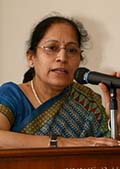
|
Manjeet Bhatia Manjeet Bhatia is an Associate Professor at the Women's Studies and Development Centre of University of Delhi. Trained in pure sciences, political science and philosophy, she is truly an interdisciplinary academician. She has been working in the area of gender studies for more than two decades. Manjeet teaches gender studies to post graduates, research scholars and runs University Grants Commission's sponsored refresher courses for teachers. She has undertaken many, local, regional, national and international research projects and has made several presentations in different forums. She has two (edited) books and several research papers to her credit. Her third book, Locating Gender in New Middle Class is under publication. She is currently researching on various aspects of Gender and Globalisation; Gender and the New Middle Class. She is an active member of the Indian Association of Women’s Studies. Manjeet has been visiting scholar at the Indian Institute of Advanced Study, Shimla, India and at the Department of Politics, University of Hull, UK.
|

|
Jennifer Coates is an Assistant Professor in the Hakubi Center for Advanced Research, hosted by the Graduate School of Letters at Kyoto University. She was awarded a PhD in 2014 from the School of Oriental and African Studies, University of London for her thesis on female representation in postwar Japanese popular cinema. She has been a Kluge Fellow at the Library of Congress, Washington D.C. (2012) and a Visiting Research Fellow at the Australian National University (2011). Her publications include 'The Shape-Shifting Diva: Yamaguchi Yoshiko and the National Body' in the Journal of Japanese and Korean Cinema (July 2014), 'Victims and Bystanders: Women in the Japanese War Retro Film' in the Journal of Media, War and Conflict (December 2013), and Making Icons: Repetition and the Female Image in Japanese Cinema, 1945–1964 (Hong Kong University Press, 2016).
|

|
Linda Flores is an Associate Professor in Modern Japanese Literature in the Faculty of Oriental Studies at the University of Oxford and a Fellow in Japanese at Pembroke College, University of Oxford. She received her PhD in East Asian Languages and Cultures from the University of California, Los Angeles. Her research interests include women's writing, gender theory, proletarian literature and trauma fiction. Her current research project involves a study of literary responses to the March 2011 Triple Disaster (earthquake, tsunami and nuclear crisis) in Japan, or 'post 3.11 writing,' with a particular emphasis on writing from and about the Tohoku region.
|

|
Barbara Hartley is a Senior Lecturer in the School of Humanities at the University of Tasmania, Australia. She has written extensively on representations of women and girls in Japanese narrative. She also has a strong interest in the manner in which the discursive space of China is represented in Japanese narrative and visual art. She has recently contributed the chapter of feminist literary analysis to the Routledge Encyclopaedia of Modern Japanese Literature. She also has a chapter entitled 'Manga, History, and Telling Stories of the Past: Narrative Strategies in Shanaō Yoshitsune' in the forthcoming Palgrave edited collection entitled, Rewriting History in Manga.
|

|
Kyungja Jung is Senior Lecturer in Social and Political Sciences at University of Technology Sydney. Kyungja's academic interests are experientially grounded in and inspired by her involvement in women's activism in Australia and Korea. Drawing on feminist theory(s) of intersectionality of gender and sexuality her research has been interested in mapping the gendered nature of social processes from cross-cultural and interdisciplinary approaches. Her areas of research include women's movements, women's policy, North Korean female defectors, sex workers, violence against women, in particular, migrant women's issues. Kyungja's research has been published in academic journals including Hecate, Asian Survey, Asian Journal of Women's Studies and the International Review of Korean Studies and she has book chapters in Women's Movements: Flourishing or in Abeyance and The Work of Policy: An International Survey. She has also published a co-authored book: Sex Trafficking Or Shadow Tourism?: The Lives of Foreign Sex Workers in Australia and a monograph Practicing Feminism in South Korea: Sexual Violence and the Women's Movement (London: Routledge, 2013).
|

|
Emerald King is a lecturer in Japanese language and popular culture at the Victoria University of Wellington. Her research interests include Japanese women writers, textual violence, and reading costumes/cosplays as text. In 2009–2010 she was a Japan Foundation Fellow and studied at Ochanomizu University in Tokyo, Japan. Her publications include 'The Mountain Witch at the Train Station: The Yamauba and the Shōjo in Aoyama Nanae's Hitori Biyori' in the Graduate Journal of Asia Pacific Studies; 'Mazohizumu no Mon: Masochistic and Sadist Representations of Women in Japanese Exploitation Films and Reidissu komikku,' in Image and Narrative; and 'Girls who are boys who like girls to be boys: BL and the Australian cosplay community' in issue 32 of Intersections. More recently, her research into cosplay has expanded her article on cosplay costumes as an act of fan translation, Tailored Translations – Translating and Transporting Cosplay Costumes Across Texts, Cultures, and Dimensions,' can be found in Signata vol 7 published at the end of 2016.
|
|
Malcolm Mintz received his Ph.D. in Linguistics at the University of Hawai'i where he also minored in Southeast Asian Studies. Subsequently he spent three years teaching Linguistics at Universiti Sains Malaysia in Penang and until recently was employed at Murdoch University in Perth, Western Australia, where he developed and coordinated a program of Malay and Indonesian language. Currently Dr. Mintz is an Honorary Research Fellow at the University of Western Australia, also in Perth. Dr Mintz has also taught in the United States, the Philippines and Papua New Guinea. He carries out research on Malay and Indonesian as well as the Philippines and has published a number of books and articles related to these areas
|

|
Caroline Norma lectures in a translation and interpreting masters degree at RMIT University and is the author of The Japanese Comfort Women and Sexual Slavery during the China and Pacific Wars (Bloomsbury, 2016). She is a leading feminist abolitionist campaigner in Australia and researches critical approaches to prostitution and pornography in history and in policy-making.
|

|
A graduate of Nihon University and a member of the School of Psychology at Suragadai University in Saitama, Japan, Eiko Osaka conducts research in fields that include Japanese language education and language policy. From that perspective, she has examined the impact of the so called Korean 'wave' in Japan. She has also published in the area of gender studies particularly with reference to women and work. A recent article examines the manner in which traditional gender roles are represented in women's magazines in Japan.
|



